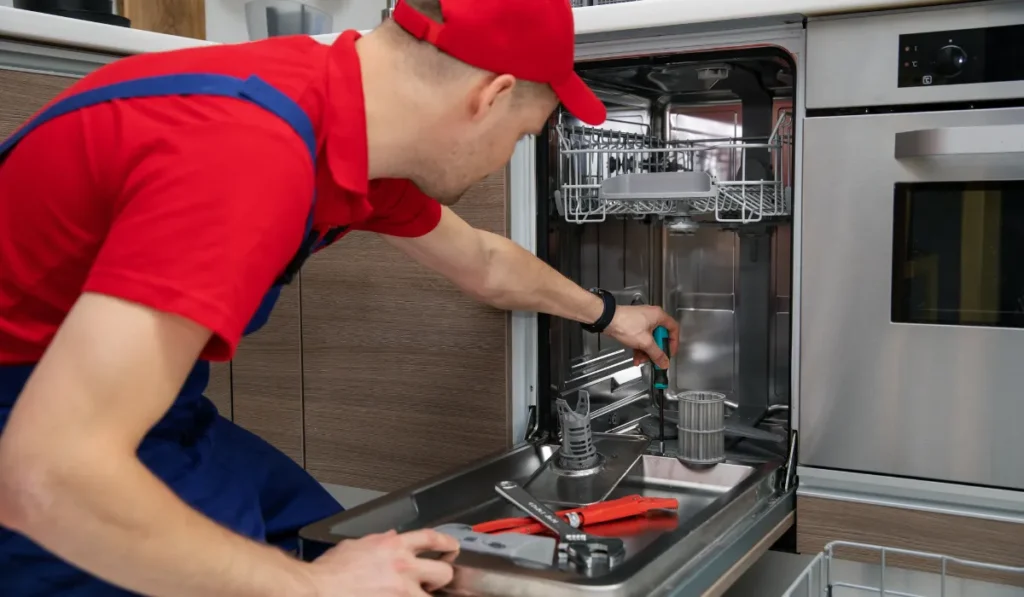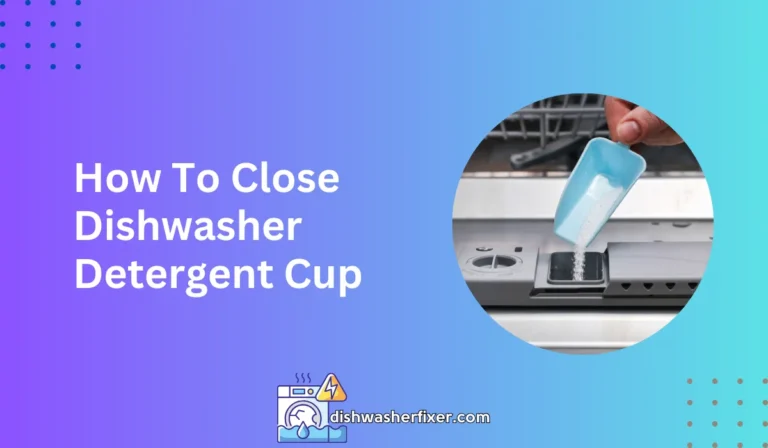Do Dishwashers Turn Off Automatically? Safety Facts Revealed
Yes, modern dishwashers are designed to turn off automatically after completing their washing cycle. This feature ensures safety, energy efficiency, and convenience. Once the cycle ends, the machine will shut down, signaling that the dishes are clean.
Automatic Shut-Off Feature in Modern Dishwashers

Understanding the Automatic Shut-Off Feature
Modern dishwashers come with a convenient feature that adds to their appeal—the automatic shut-off. This function allows the dishwasher to turn itself off once the wash cycle is complete.
It is a sophisticated integration of technology designed to save time and provide peace of mind for users.
When the dishes are clean, and the drying phase is done, the dishwasher detects the end of the cycle and powers down without any manual intervention.
Contributing to Energy Efficiency
Automatic shut-off in dishwashers is not just a matter of convenience, it also contributes significantly to energy efficiency.
By turning off after the cycle, the dishwasher avoids unnecessary energy use that would occur if it continued to run.
This feature ensures that only the required amount of energy is consumed, thus reducing electricity bills and conserving resources, making it an eco-friendly choice for households.
Timers and Sensors at Work
The magic behind the automatic shut-off lies in the timers and sensors built into the dishwasher. Timers are programmed to run for the duration of the chosen wash cycle.
Once the time elapses, the dishwasher knows to cease operation. Sensors, on the other hand, detect the cleanliness of the water and the level of humidity inside the machine.
Safety Benefits of Automatic Shut-Off
Safety is a paramount concern in any home appliance, and the automatic shut-off feature in dishwashers addresses this by preventing overheating and potential fire hazards.
It also reduces the risk of water leakage, as the machine will not continue to run indefinitely in the event of a malfunction. This built-in safety mechanism gives homeowners added reassurance.
Factors Influencing the Auto Shut-Off Function

Wash Cycle Lengths and Variability
Dishwashers offer a variety of wash cycle options, each with a pre-set length.
Whether it’s a quick rinse or an intensive wash, the automatic shut-off is programmed to correspond with the specific cycle chosen, ensuring optimal functionality and energy use.
The variability in wash cycles allows users to select the most appropriate setting for their needs, knowing the shut-off will align with their choice.
Soil Sensors Adjusting Cycle Duration
Advanced dishwashers are equipped with soil sensors that detect the level of dirt on dishes and adjust the cycle duration accordingly.
If the dishes are particularly dirty, the sensors may extend the wash cycle to ensure a thorough clean, which could affect the timing of the automatic shut-off.
Smart Home Integration and Control
Many modern dishwashers can be integrated with smart home systems, allowing for remote monitoring and control.
This technology enables users to start, stop, or monitor their dishwasher cycles from their smartphones or other devices, enhancing the functionality of the automatic shut-off feature by providing additional oversight and control.
Impact of Delayed Start on Shut-Off
The delayed start function allows users to program their dishwasher to begin at a later time, which can influence the time at which the automatic shut-off is activated.
This feature is particularly useful for running the dishwasher during off-peak hours to save on energy costs or to have dishes ready at a more convenient time.
Troubleshooting and Maintenance Related to Auto Shut-Off

Identifying Common Shut-Off Issues
Sometimes a dishwasher may not turn off automatically as expected. This could be due to a malfunctioning timer, faulty sensors, or a disrupted power supply.
Identifying the root cause is the first step in troubleshooting these issues and restoring the auto shut-off function.
Routine Maintenance for Shut-Off Reliability
Regular maintenance is key to ensuring the automatic shut-off feature operates correctly.
This includes cleaning the sensors, checking for obstructions in the dishwasher’s filter system, and verifying that the door latches securely, as an ajar door can prevent the dishwasher from shutting off.
When to Call in the Professionals
If after basic troubleshooting the dishwasher still fails to turn off, it may be time to consult a professional.
A certified technician can diagnose and repair complex issues, such as electrical problems or malfunctioning control panels, which are beyond the scope of routine maintenance.
Extending the Lifespan of Your Dishwasher
To maximize the lifespan of your dishwasher and its automatic features, it is advisable to use it according to the manufacturer’s guidelines, avoid overloading, and periodically run it on a hot water cycle to clear out any buildup.
These practices will help maintain the efficiency and reliability of the automatic shut-off.
FAQs About Automatic Dishwasher Shutoff
Do all modern dishwashers have an automatic shutoff feature?
Yes, most modern dishwashers come with an automatic shutoff feature to ensure safety and energy efficiency.
What happens when a dishwasher’s cycle completes?
Once the cycle completes, the dishwasher will turn off automatically, signaling that the dishes are clean.
Is it safe to leave a dishwasher running unattended?
Yes, due to the automatic shutoff feature, it is generally safe to leave a dishwasher running unattended.
Does the automatic shutoff feature on dishwashers save energy?
Yes, the automatic shutoff feature helps to save energy by turning the dishwasher off after the cycle is complete.
How will I know if my dishwasher has completed its cycle?
Most dishwashers signal the end of a cycle with an audible alert or light indicator, in addition to the automatic shutoff.
Final Thoughts
Modern dishwashers are equipped with an automatic shut-off feature to enhance safety, energy conservation, and user convenience.
After completing the washing cycle, these appliances will power down on their own, indicating the cleaning process is finished and the dishes are ready to be put away.





